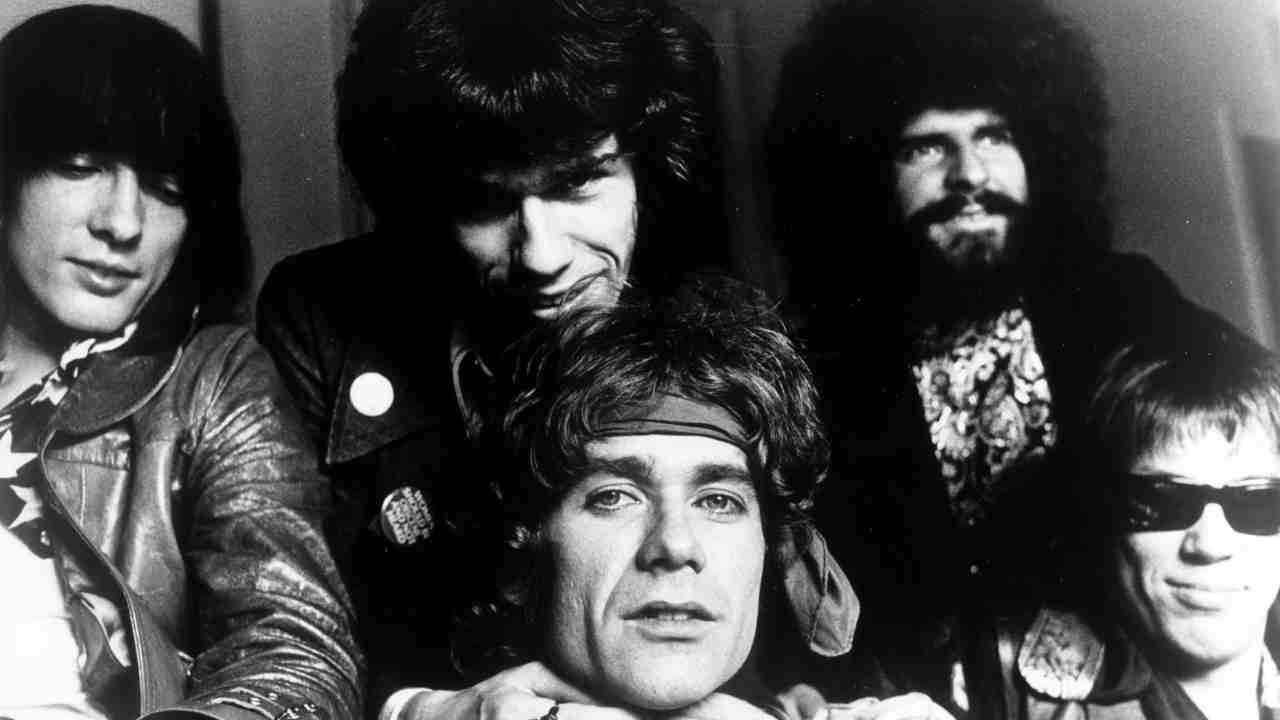Vivian Campbell: 10 records that changed my life
Def Leppard and Last In Line guitarist Vivian Campbell picks 10 albums that shaped his world

Select the newsletters you’d like to receive. Then, add your email to sign up.
You are now subscribed
Your newsletter sign-up was successful
Want to add more newsletters?
Guitarist Vivian Campbell has had a very distinguished career. Since 1992, he's been a member of Def Leppard, who were inducted into the Rock And Roll Hall Of Fame in Brooklyn in 2019. He's also with Last In Line, the band who began as a tribute band to Dio.
Campbell started out with NWOBHM hopefuls Sweet Savage, before getting a big break when being chosen as the first guitarist with Dio, and then signing up with Whitesnake at the height of their commercial power in the late 80s. He's also worked with Lou Gramm, Riverdogs and Shadow King.
Here, Vivian chooses the 10 records which have helped to shape his life and musical sound.

T. Rex – The Slider (EMI, 1972)
“My older sister Fiona and what she listened to was a big influence on me when I was very young and just getting into music. It was through here that I got into T. Rex. Seeing Marc Bolan on Top Of The Pops on a Thursday evening as a kid was my first true exposure to a rock star.
After seeing him, I wanted to grow my hair, wear my sister's clothes and get a Les Paul. And listening to The Slider, well it's has incredible songs like Telegram Sam and Metal Guru. That made a major impression on me.”
Rory Gallagher – Live In Europe (Polydor, 1972)
“At Christmas in 72, my cousin gave me a copy of this album as a present. It was the first record I ever owned. Live In Europe had only just come out, and this was proper rock, not pop nonsense. And it was Rory who fired me up to want to be a guitarist.
"With Marc Bolan, it was all about the whole package, but this man was such a great musician. And this is a live album – and onstage was always where Rory was at his best.”
Sign up below to get the latest from Classic Rock, plus exclusive special offers, direct to your inbox!
Lynyrd Skynyrd – Pronounced Leh-nerd Skin-nerd (MCA, 1973)
“It was at Christmas 1973 that the same cousin who gave me the Rory album now introduced me to southern rock. And for a while I was really into the whole southern rock style. The three guitars, a classic like Free Bird... it really won me over.
"But when I listened to other southern albums I realised this band and album weren't typical of the genre, but they represented the very best of that style of music. The cream of the crop. Nothing else comes close. I was 11 years old and on a journey of guitar discovery. And this made its mark on me.”
Thin Lizzy – Johnny The Fox (Vertigo, 1976)
“I am a massive Lizzy fan. Everyone knows that. So I have to put this album into my selection. A song like Don't Believe A Word is of course timeless. But then every track on this album is special.
"There are so wonderful moments from Brian Robertson on guitar, with the riffs and solos, which really bring out his talent. And those dual guitar moments with Scott Gorham still startle me.”
Kate Bush – The Kick Inside (EMI, 1978)
“I know this isn't strictly rock. But she was someone I had a teenage crush on. I saw her on Top Of The Pops and loved what she did on Wuthering Heights. That was unlike anything I'd ever heard before.
"I was mesmerised by her voice as well, even though my mum hated it. Kate Bush had a unique sound and to this day I am a big fan of hers.”
Deep Purple – Come Taste The Band (Purple Records, 1975)
“I know for most people, it's all about the classic era of Purple and the Mk 2 line-up. And I was aware of them, because my sister had Fireball, and I would sneak into her room to listen to it when she wasn't around. But my best friend Ray Haller, who was in Sweet Savage with me, had this album, and lent it to me. We even did Love Child live in Sweet Savage.
"I love the funk influence here, and this really turned me on to Tommy Bolin as a guitarist, and the band also had two great vocalists at the time, with Glenn Hughes and Lord Coverdale. But it was the way they mixed rock and funk that got my attention.”
The Stranglers – Rattus Norvegicus (United Artists, 1977)
“I got into this because whenever my sister got annoyed she'd storm off to her room and play it – very loudly! So, it got my attention, even though I didn't want to like it, because it was part of the punk era.
"However, The Stranglers were not strictly punk as such. I thought Hugh Cornwall had a lovely guitar tone, and the songs were very strong. They had a powerful and enticing sound all their own.”
Bad Company – Straight Shooter (Island, 1975)
“I got into Free through discovering Bad Company. There was an obvious musical connection between the two bands. But I must mention Mick Ralphs. I think he is incredibly underrated, and whenever I listen to what he did on Straight Shooter, it reminds me that he deserves a lot more respect than he's ever been given. And of course there are also some wonderful songs on this record.”
Thin Lizzy – Live And Dangerous (Vertigo, 1978)
“Lizzy are such an important band in my life that I have to pick second choice from them. It was a very close run thing between this and Black Rose: A Rock Legend.
"Both have a monumental impact on me. In the end, I've gone for Live And Dangerous because it came out a year earlier. Nobody should need to be told how amazing it is.”
Rory Gallagher – Calling Card (Chrysalis, 1976)
“I cannot stress how important Rory Gallagher is to me. I saw him live at my first ever concert, my second ever concert and my third ever concert. Not many bands came to Belfast, so it was a treat to see him close up quite often in my younger days, This is my favourite Rory studio album.
"And while people always associate him with the blues, when you listen to something like Do You Read Me, there's definitely a little funk in there. As I said earlier, funk always appealed to me. Ronnie James Dio once joked that I came from the black side of Belfast, even through there wasn't such an area in the city back then. That summed up my love for funk.”
Malcolm Dome had an illustrious and celebrated career which stretched back to working for Record Mirror magazine in the late 70s and Metal Fury in the early 80s before joining Kerrang! at its launch in 1981. His first book, Encyclopedia Metallica, published in 1981, may have been the inspiration for the name of a certain band formed that same year. Dome is also credited with inventing the term "thrash metal" while writing about the Anthrax song Metal Thrashing Mad in 1984. With the launch of Classic Rock magazine in 1998 he became involved with that title, sister magazine Metal Hammer, and was a contributor to Prog magazine since its inception in 2009. He died in 2021.

